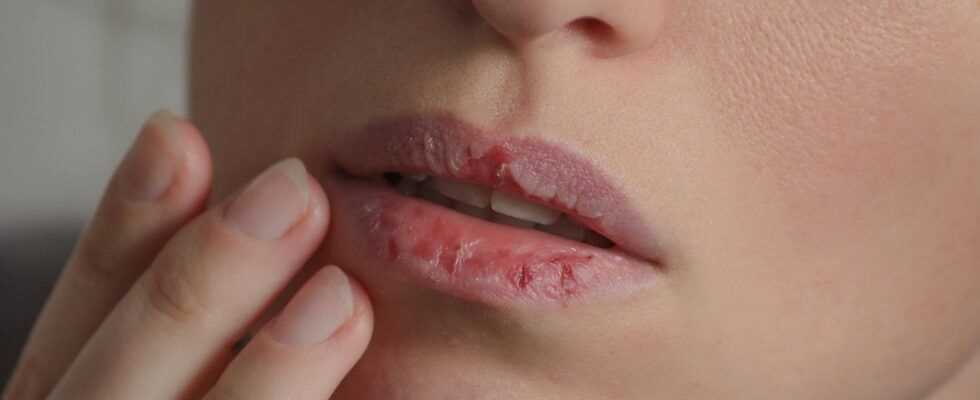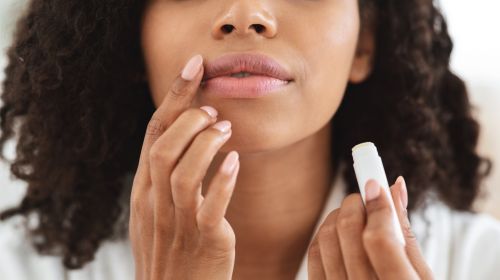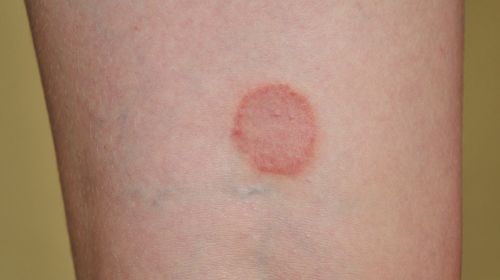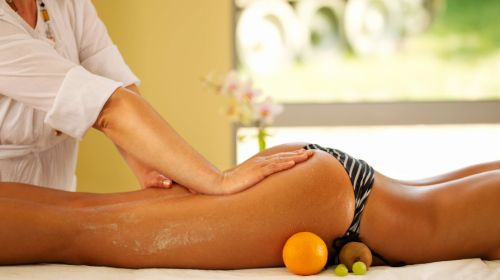Many people suffer from dry lips, especially in winter, which are easy to tear and pain. How it comes to chapped lips, which lip care works best and how simple home remedies make the lips soft again.
- Dry lips need care from the inside and outside.
- © iStock.com/Tetiana Mandziuk
Almost everyone suffers from dry lips every now and then, especially in winter. The skin on the lips has few sebum glands and is very sensitive to environmental influences such as wind and cold. Dry, chapped lips feel uncomfortable and can be painful. Pathogens can also enter the body through cracked lips. Therefore, dry lips are anything but a cosmetic problem.
Article content at a glance:
Common causes of dry lips
Mostly external causes affect the lips: cold, wet, friction or UV radiation. Even those who constantly lick their lips or nibble on them – be it out of nervousness, stress or because the skin on the lips is tight – additionally dry out the skin through enzymes in the saliva and make it brittle. Painful small wounds and cracks quickly develop, and simple mouth movements such as laughing or eating can even bleed.
Drinking little keeps your lips dry
In addition to headaches, dry lips are one of the body's most prominent warning signs of dehydration. Those who suffer from it often should check whether they are drinking enough. During the day there should be at least 1.5 liters of fluid intake, preferably in the form of water and unsweetened tea. Those who do a lot of sport or spend the whole day in dry, heated air in winter need more fluids. This also applies to hot days: the body needs more fluids in the sun and warmth, otherwise there is a risk of dry lips and other complaints.
When there is a serious illness behind dry lips
Sometimes persistent dry lips can also be a warning sign of illness or a vitamin deficiency – especially if they are accompanied by scaly, bloody spots or in the form of torn corners of the mouth. Open wounds on the skin are also a possible entry portal for pathogens: viruses such as herpes simplex, bacteria or fungi such as Candida albicans can settle in the affected skin and lead to infections such as thrush. If the skin on the lips is constantly cracked and rough despite adequate hydration and care, a metabolic disorder such as diabetes mellitus can be behind it. Permanently torn corners of the mouth, so-called corner angular chords, can be signs of a deficiency in vitamin B2 or iron deficiency.
Why is the skin of the lips so sensitive?
The skin of the lips is three to four times thinner than the rest of the face. It has no hair to protect it against the cold, no sweat glands to moisturize and no sebum glands to keep it supple. The skin pigment melanin, which causes cornification and tan in other areas, is also hardly present in the skin of the lips. This allows the blood vessels to shine through, which on the one hand makes the lips appear pink, but on the other hand offers little protection against harmful UV radiation. All of this makes the lips so sensitive to environmental influences such as sun, cold and wind.
The right care for dry lips
If you cannot get dry lips with cracks, blisters or other skin changes under control in just a few weeks, a visit to your family doctor or dermatologist is advisable.
The best way to combat dry lips is to drink a lot and use the right care products. Again and again you read that you shouldn't use lip balm all the time, as you can become downright dependent on it. Without the usual care layer, the skin feels dry, tight and stinging. However, lip care is not to blame for this and it does not destroy your own protection, but you just get used to the pleasantly smooth feeling that the care stick leaves on the lips. In order to get rid of the constant use of the lip balm, it helps to only use it during the day when necessary and to apply a high-quality care product in the evening.
On very cold days, in strong sunlight and whenever the lips are dry, burning or tense, they need additional care. In winter, this care product may contain a lot of grease; in the case of strong UV radiation, a high sun protection factor is particularly important.
Which lip balm stick for dry lips?
Lip balm not only stays on the lips, but also ends up in the stomach as part of it is swallowed. But the body can digest it well as long as the substances it contains are non-toxic. That's why you should take a look at the ingredients when choosing lip care. Care sticks are always based on fat or hydrogenated oil. Paraffins are made on the basis of mineral oils, i.e. crude oil, and often contain toxic heavy metals. It is better if the lip care is based on the highest possible quality and therefore non-toxic vegetable oils such as coconut oil, cocoa butter or shea butter.
Ointments for chapped, inflamed lips
The active ingredient dexpanthenol, which is contained in most wound healing ointments, is suitable for skin care and healing support for chapped, dry and chapped lips. Zinc has an anti-inflammatory effect, protects the skin and is therefore often contained in care sticks for extreme temperatures and very strong sunlight, for example during winter sports.
Petroleum jelly is a classic for lip care, but petroleum jelly only contains fat and no moisture. This is ideal for protection against the cold in winter, but not very caring for a lack of moisture. Petroleum jelly is also available as organic petroleum jelly free of mineral oil.
If the wounds and inflammation persist and do not heal, the dermatologist can prescribe an ointment with cortisone. It can break the cycle of dry, flaky and repeatedly tearing lips. You should only use cortisone for a short time.
Home remedies for dry lips
Proven medicinal plants that contain many lip care products and healing ointments are marigold (calendula) and arnica. Chamomile also has anti-inflammatory effects, but it can also dry out the skin, while aloe vera moisturizes the skin. The medicinal plant is contained in many care products and is also available pure as aloe vera gel in health food stores.
A tried and tested home remedy for dry lips is to rub a spoonful of honey on your lips. Leave the honey on for ten minutes without licking it, as this would dry out the lips even more. It is better to carefully dab the honey off with a cloth. Alternatively, the honey can be mixed with some quark and left on the lips for ten minutes. A honey mask overnight can help with persistently dry lips.
Schüssler salts and Schüssler ointments are also suitable for dry lips. Let two to three tablets dissolve on the tongue three times a day or apply Schüssler ointment to the lips three times a day.
Schüssler salt No. 8 (sodium chloratum) with dry lips with a feeling of tension; increases the moisture content of the skin.
Schüssler salt N. 1 (Calcium fluoratum) for chapped, chapped lips with crust formation.
Schüssler Salt No. 11 (Silicea) for dry skin that tends to wrinkle. Also helps against upper lip wrinkles.
Prevent dry lips with a daily care program
Lips that are prone to dryness need regular grooming. The evening lotion with a good care product should be part of the daily care ritual for dry lips. A lip peeling is ideal as a preventive measure, as it provides the skin with particularly good blood circulation and makes it receptive to nutrients and care products.
Lip peeling is very easy with a soft toothbrush: gently massage the damp lips and then apply lotion. You can also easily make a peeling yourself: Mix a teaspoon of sesame oil with one or two teaspoons of sugar and a little honey. Rub everything gently on your lips and rinse off. Then apply lip balm.



